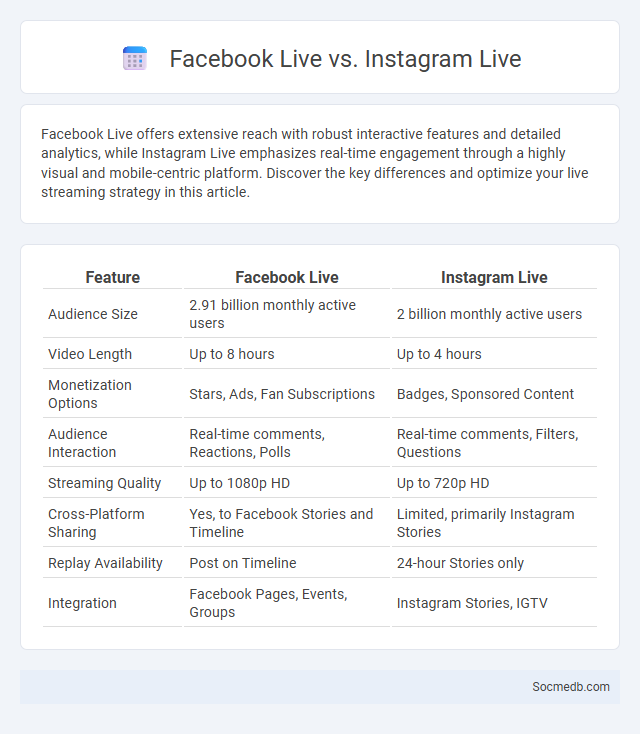
Photo illustration: Facebook Live vs Instagram Live
Facebook Live offers extensive reach with robust interactive features and detailed analytics, while Instagram Live emphasizes real-time engagement through a highly visual and mobile-centric platform. Discover the key differences and optimize your live streaming strategy in this article.
Table of Comparison
| Feature | Facebook Live | Instagram Live |
|---|---|---|
| Audience Size | 2.91 billion monthly active users | 2 billion monthly active users |
| Video Length | Up to 8 hours | Up to 4 hours |
| Monetization Options | Stars, Ads, Fan Subscriptions | Badges, Sponsored Content |
| Audience Interaction | Real-time comments, Reactions, Polls | Real-time comments, Filters, Questions |
| Streaming Quality | Up to 1080p HD | Up to 720p HD |
| Cross-Platform Sharing | Yes, to Facebook Stories and Timeline | Limited, primarily Instagram Stories |
| Replay Availability | Post on Timeline | 24-hour Stories only |
| Integration | Facebook Pages, Events, Groups | Instagram Stories, IGTV |
Overview of Facebook Live, Instagram Live, and Live Streaming
Facebook Live, Instagram Live, and Live Streaming platforms offer real-time video broadcasting features that enhance user engagement through interactive comments and reactions. Facebook Live supports wide audience reach with integrated event scheduling and analytics, while Instagram Live emphasizes mobile-friendly, casual connections within user followers. Live Streaming encompasses diverse applications across social media, gaming, and professional events, optimizing audience interaction and content immediacy through optimized bandwidth and low-latency technology.
Platform Popularity and Audience Demographics
Facebook remains the leading social media platform with over 2.9 billion monthly active users, predominantly attracting adults aged 25-34. Instagram, favored by younger audiences aged 18-29, boasts more than 2 billion active users, leveraging visual content for engagement. TikTok's rapid growth captures Generation Z with short-form video content, having surpassed 1 billion monthly active users globally.
Ease of Use and Accessibility
Social media platforms prioritize intuitive interfaces and streamlined navigation to enhance ease of use for diverse audiences. Features like voice commands, screen readers, and customizable settings improve accessibility for users with disabilities. Mobile app optimization ensures seamless access across various devices, expanding social media reach and engagement globally.
Features and Interactive Tools Comparison
Social media platforms offer diverse features such as real-time messaging, multimedia sharing, and customizable profiles that enhance user engagement and connectivity. Interactive tools like live streaming, polls, and story highlights enable dynamic communication and audience participation across platforms such as Instagram, Facebook, and Twitter. Algorithm-driven content recommendations and advanced analytics further optimize user experience and targeted advertising effectiveness.
Video Quality and Streaming Performance
High video quality and seamless streaming performance are critical for an engaging social media experience, directly impacting viewer retention and interaction rates. Optimizing video resolution, bitrate, and encoding settings ensures smooth playback across diverse devices and network conditions, enhancing your content's accessibility and reach. Leveraging adaptive streaming technology allows your videos to adjust dynamically, providing viewers with the best possible quality without buffering interruptions.
Monetization and Revenue Opportunities
Social media platforms offer diverse monetization strategies including advertising, sponsored content, and subscription-based models. Influencers and brands capitalize on affiliate marketing and product placements to drive revenue while leveraging user engagement analytics to optimize campaigns. Emerging features like in-app shopping and virtual tipping further expand income opportunities for creators and businesses.
Engagement Metrics and Analytics
Engagement metrics such as likes, shares, comments, and click-through rates provide critical insights into audience interaction and content performance on social media platforms. Advanced analytics tools track user behavior patterns, enabling marketers to optimize content strategies for higher reach and conversion rates. Monitoring these data points helps businesses understand audience preferences and tailor campaigns to boost overall social media ROI.
Content Types and Use Cases
Social media platforms support diverse content types including text, images, videos, stories, and live streams, each optimized for specific audiences and engagement strategies. Brands leverage these formats for use cases such as brand awareness, customer support, influencer marketing, and community building to drive user interaction and conversions. Your content strategy should align with platform algorithms and audience preferences to maximize reach and impact.
Privacy, Security, and Moderation Options
Social media platforms implement robust privacy settings enabling users to control data visibility and sharing preferences, which mitigate unauthorized access and data breaches. Advanced security measures such as two-factor authentication, encryption, and continuous monitoring protect user accounts from hacking and phishing attacks. Effective content moderation options combine AI algorithms and human reviewers to detect and remove harmful, misleading, or inappropriate content while balancing free expression and community standards.
Choosing the Best Live Streaming Platform for Your Goals
Selecting the best live streaming platform depends on your target audience, content type, and desired interactive features. Platforms like Twitch excel for gaming communities, while YouTube Live and Facebook Live offer broader reach and monetization options for diverse content creators. Evaluating platform analytics, viewer engagement tools, and compatibility with your content strategy ensures optimal live stream performance and audience growth.
 socmedb.com
socmedb.com